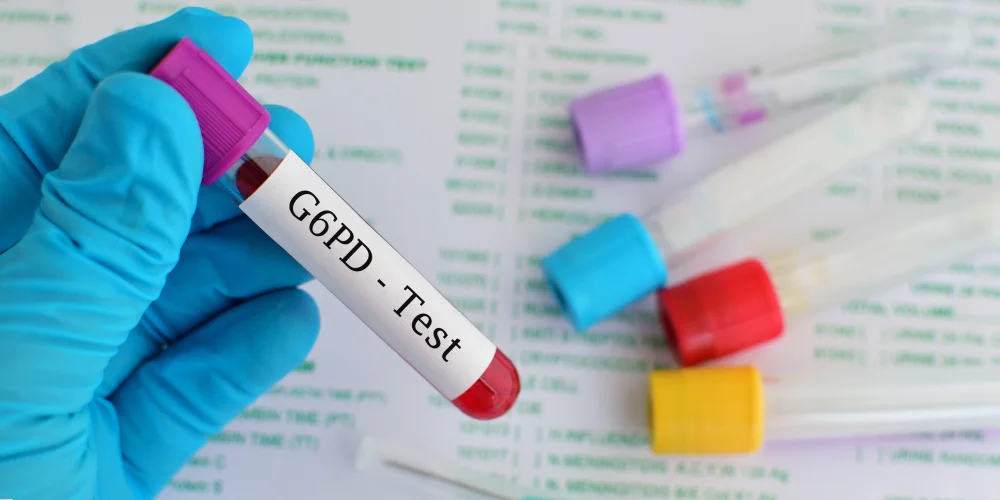Glucose-6-Phosphate Dehydrogenase
Diagnosis, Preparation, and Management
Glucose-6-Phosphate Dehydrogenase test is an essential diagnostic tool used to detect G6PD deficiency, a genetic condition affecting red blood cells. G6PD plays an integral part in protecting red blood cells against oxidative damage; an absence can result in hemolytic anemia from certain medications, foods or infections causing hemolytic anemia; this test measures activity of Glucose-6-Phosphate Dehydrogenase enzyme in red blood cells providing vital insight for diagnosis and management of this disorder. Glucose-6-Phosphate Dehydrogenase is an essential diagnostic tool used to detect Glucose-6-Phosphate Dehydrogenase deficiency, a genetic condition affecting red blood cells. Glucose-6-Phosphate Dehydrogenase plays an integral part in protecting red blood cells against oxidative damage; an absence can result in hemolytic anemia from certain medications, foods or infections causing hemolytic anemia; this test measures activity of Glucose-6-Phosphate Dehydrogenase enzyme in red blood cells providing vital insight for diagnosis and management of this disorder.

When is the G6PD Test Prescribed?
The G6PD Test can be prescribed in various situations. It may be suggested to individuals exhibiting symptoms of hemolytic anemia, including fatigue, jaundice and dark urine; newborns exhibiting unexplained jaundice; prior to starting medications known to trigger hemolysis in G6PD-deficient individuals and for patients who have family histories of Glucose-6-Phosphate Dehydrogenase deficiency – understanding such circumstances helps healthcare providers better manage and mitigate potential risks related to G6PD deficiency.
Preparation for the G6PD Test.
No special preparation is necessary to take part in a Glucose-6-Phosphate Dehydrogenase Test; patients can eat and drink as usual prior to testing. However, it’s essential that any medications or supplements being taken that might interfere with test results are disclosed to healthcare provider so any adjustments to medications or doses can be provided as instructed if needed; having open communication between healthcare provider and patient helps in getting accurate test results.
Parameters Considered in G6PD Test
The G6PD Test measures activity levels of Glucose-6-Phosphate Dehydrogenase enzyme in red blood cells to assess its functioning normally or indicate deficiency, helping assess hemolytic anemia risk as well as guide treatment and management plans accordingly. Abnormal results could suggest deficiency which would assist healthcare managers in treating it effectively while offering crucial insights into your blood’s resistance against oxidative stress, providing essential insights that contribute towards effective healthcare administration and management strategies.
Time Required for G6PD Test Report.
Glucose-6-Phosphate Dehydrogenase Testing is an easy process that usually only takes minutes to collect blood samples for laboratory analysis, and results typically become available within hours to 24 hours depending on lab workload – providing timely diagnosis and prompt medical interventions when required.
G6PD Test Price
Our Glucose-6-Phosphate Dehydrogenase Test can be purchased at an accessible price point of Rs895. It provides invaluable insights into enzyme activity for diagnosis and management of G6PD deficiency, helping more individuals benefit from timely detection and appropriate care.
Book an Appointment for G6PD Test
Chirayu SuperSpeciality Hospital makes booking your Glucose-6-Phosphate Dehydrogenase Test easy. You can simply schedule it through our website or reach out to our team directly. Both options ensure prompt, professional service dedicated to meeting all of your healthcare needs in an easy, seamless experience at our pathology lab in Bhayandar.
What Our Patients Say
Hear from our valued patients about their experiences at Chirayu Super Speciality Hospital and how our care has made a positive impact on their health and well-being.


I felt well taken care of during my G6PD test at Chirayu. Efficient and professional service.


Very satisfied with the G6PD test services. The staff explained everything clearly and were very supportive.


The affordable price for the G6PD test at Chirayu is a huge plus. Excellent care provided.


Chirayu SuperSpeciality Hospital made the G6PD testing process easy and hassle-free. Great experience.


Excellent service! The staff was professional, and I received my G6PD test results promptly.


The G6PD test at Chirayu SuperSpeciality Hospital was quick and informative.
Frequently Asked Questions
Here, we provide answers to some of the most commonly asked questions to help you better understand our services, policies, and facilities. If you have any additional questions, please do not hesitate to contact us.
G6PD deficiency is a genetic disorder that affects the red blood cells, making them more vulnerable to breaking down prematurely.
Symptoms such as fatigue, jaundice, dark urine, or a family history of G6PD deficiency may indicate the need for this test.
The G6PD test is a simple blood test with minimal risks, similar to any standard blood draw.
Management includes avoiding triggers such as certain medications, foods, and infections that can cause hemolysis.
Early detection in newborns can prevent severe jaundice and related complications by guiding appropriate care and dietary adjustments.